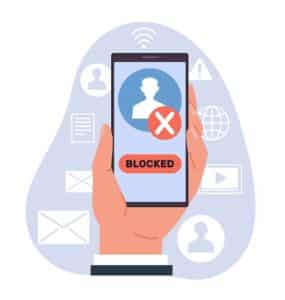In-Home Care – 4 Things Seniors Can Do To Stay Safe On Social Media
 Social media is a daily part of life for many seniors. When it’s used correctly, social media can provide a vital social connection for seniors that are living independently. There are many benefits seniors get from living independently, but they can face a higher risk of social isolation when they are living alone. Social media can fill in the gaps and help seniors make friends and connect to the outside world. There are also a lot of dangers on social media. Seniors can become too attached to social media, and there are a lot of scammers that prey on seniors using social media. Some things that seniors can do to use social media safely are:
Social media is a daily part of life for many seniors. When it’s used correctly, social media can provide a vital social connection for seniors that are living independently. There are many benefits seniors get from living independently, but they can face a higher risk of social isolation when they are living alone. Social media can fill in the gaps and help seniors make friends and connect to the outside world. There are also a lot of dangers on social media. Seniors can become too attached to social media, and there are a lot of scammers that prey on seniors using social media. Some things that seniors can do to use social media safely are:
Set Time Limits
It’s a good idea for seniors to set limits on how much time they spend on social media each day. Otherwise social media can start to take over all of their time and attention. Some seniors may end up with trouble sleeping or paying attention because they are on social media all the time. Modern smartphones and tablets make it easy to set a time limit on social media apps. An in-home care provider can help your senior parent set up their phone or tablet to let them know when it’s time to get off social media for the day.
Vet All Friend Requests
Seniors should not accept any friend or follower request without vetting that profile and making sure it’s either someone that they actually know or that it’s a safe account to add. In-home care can help seniors stay safe on social media by helping them vet their friend and follower requests. A care provider can look for red flags and be sure that seniors don’t end up adding anyone sketchy to their social media accounts.
Never Send Money To Anyone
Seniors should never send money to anyone they only know on social media. It’s always a scam. If someone that your parent knows personally needs money they’re not going to ask for it through a social media app. Seniors should never add their financial accounts or credit cards to any of their social media accounts. No social media app or site will ask for a credit card for verification of anything. Make sure that your senior parent knows that they should never send money through social media apps or site for any reason.
Don’t Reveal Too Much Personal Information
Seniors have a tendency to be very open with their personal information online, and that can make them look like easy marks to criminals. To protect their identity and financial information seniors should never reveal any personal or sensitive information on social media. They should also use different passwords for social media sites than they use for things like online banking. And seniors should also change their passwords often. It’s a good idea for seniors to also avoid taking online quizzes and other interactive games on social media. They seem like harmless fun, but they are a great way for scammers to get information that they can use to steal a senior’s identity.
If you or an aging loved one are considering in-home care in Philadelphia, PA please contact the caring staff at True Direct Home Health Care today.
- How Home Health Providers Offer Education Amidst Physical Health Changes - March 5, 2024
- Spring Activities for Seniors - February 21, 2024
- How to Help an Older Loved One with Cataracts? - February 6, 2024
